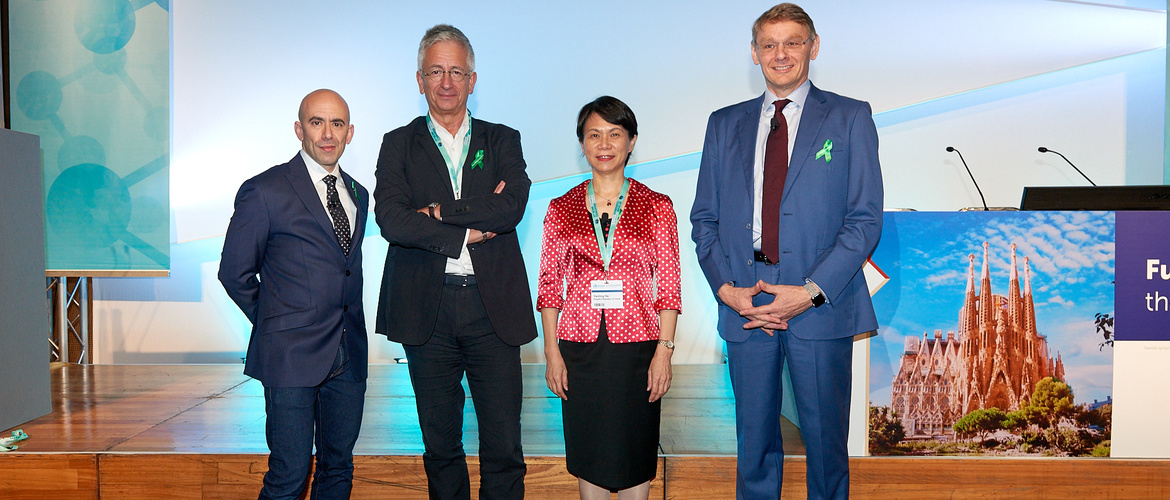
Choose a channel
Check out the different Progress in Mind content channels.

Progress in Mind

Major depressive disorder (MDD) is a heterogeneous disease characterized by many different mood, physical and cognitive symptoms. The cognitive symptoms, in particular, impair psychosocial and workplace functioning. To achieve both a symptomatic and functional recovery, experts from Australia, Belgium, China and the USA advocated shared decision-making and individualized goal setting to a large symposium audience at ECNP 2018. Shared decision-making enables individualization of treatment goals and symptoms to address functional impairments specific for each patient. The outcomes that are important to the patient then need to be measured using a new scale adapted and used for the first time in depression, which incorporates all symptom domains and functional performance.
Functional recovery from MDD facilitates psychosocial and workplace functioning, explained Yanling He, Professor of Psychiatry, Shanghai, China. Treatment strategies therefore need to address cognitive symptoms to improve symptoms associated with functioning in daily life.
Professor He highlighted a study showing that 52% of 164 patients with MDD reported that cognitive difficulty severely interfered with their occupational functioning.1 Cognitive deficits in executive function, memory and attention persist even when depression is treated,2 she added.
Nearly 70% of patients with MDD have severe functional impairment
Professor He also presented a study of 1051 full-time employed people with MDD, which demonstrated a significant association between increasing severity of depression symptoms and worsening perceived cognitive functioning based on PDQ scores (p<0.0001).3
In addition, subjective measures of cognitive symptoms have been shown to explain workplace performance variability more than severity of MDD, she said.4
At diagnosis, nearly 70% of patients with MDD have severe functional impairment,5 said Bernhard Baune, Professor of Psychiatry, Melbourne, Australia; and after treatment many patients continue to experience functional impairment at work6 and in their social life.7 Improving functional outcomes is therefore a treatment priority.
Many patients continue to experience functional impairment despite treatment
The negative impact of acute MDD on psychosocial functional outcome is mediated by executive and spatial cognitive functions,8 Professor Baune added. In the Adelaide, Cognitive Function and Mood Study, executive functions were the strongest independent predictors of psychosocial outcomes in remitted patients.9
The expectations of HCPs often do not match patients’ expectations of treatment for depression. Professor Baune described an online survey of 650 psychiatrists, 366 primary care practitioners, 30 neurologists, and 2008 patients with MDD from Brazil, Canada, Mexico, South Korea, USA, France, Italy and Spain.
Physicians and patients do not have the same expectations from treatment
The survey revealed that when compared with responses from patients, physicians gave a lower rating to the importance of treating physical and cognitive symptoms, and the largest difference was for cognitive symptoms during the acute phase of MDD.10
Are we asking patients with depression the right questions?
Most psychiatrists do not measure outcome when treating patients with depression, said Koen Demyttenaere, Professor of Psychiatry, University Psychiatric Center KU Leuven, Belgium. When we do measure outcome, are we measuring what is important to patients? For example, in a study described by Professor Baune, 55% of 274 patients who scored ≤7 on the Hamilton Depression Rating Scale (HAM-D17) — which has not been designed to measure cognitive symptoms — did not consider that they were in remission.11
Which scales should we use? And should they be subjective or objective?
Professor Demyttenaere discussed the need to measure outcome using scales that evaluate cognitive function, including:
Both the DSST and THINC-it provide an objective assessment of all four domains of cognitive function — executive function, psychomotor speed, attention and memory.
Recovery from MDD should include both symptomatic and functional recovery and involve shared decision-making, said Professor Baune. The goals of treatment depend on:
Mark Opler, Adjunct Assistant Professor of Psychiatry, New York, USA, agreed and advocated for a shared decision-making approach that:
Shared decision-making, goal setting, and measuring outcomes facilitate functional recovery
Professor Opler described a goal attainment approach, and explained the adaptation of this approach for depression with great success, for tracking progress as patients work to attain specific goals identified as part of a treatment plan. The goals for different domains of MDD — psychological, motivation, emotional, physical and cognition — are generated through a collaborative discussion of the patient’s experience of MDD and related symptoms and the impact of these experiences on their life.
It is then important to measure the outcomes that are important to patients using appropriate scales that incorporate all symptom domains and functional performance.
Educational financial support for this symposium was provided by H. Lundbeck A/S
Takeda Pharmaceuticals and H. Lundbeck A/S co-sponsored, designed the Goal Attainment Study and adapted the Goal Attainment Scale for Depression. This study evaluated a novel approach, using GAS in clinical research adapted for depression for the first time, to measure outcomes that matter to the patients. If you want to learn more click on the link to watch Professor Mark Opler presenting Goal Attainment adapted for Depression.